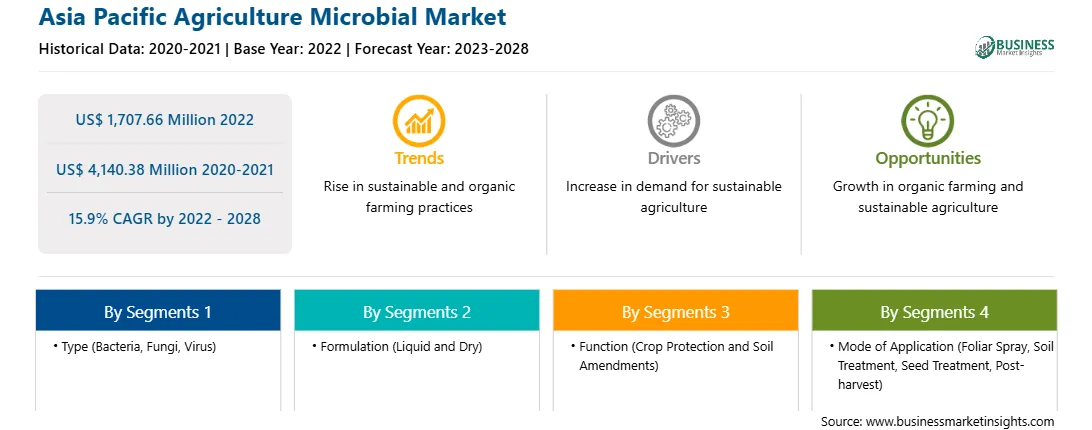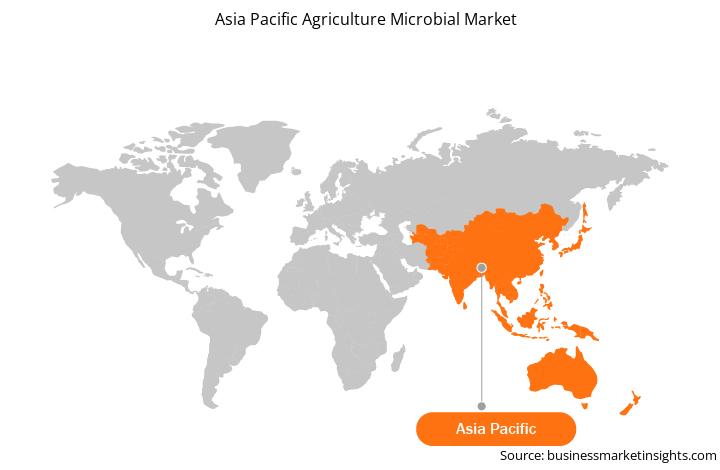Increasing Research and Development Activities
Agriculture microbial products are gaining popularity region due to their various advantages in crop protection and soil amendments. Bacteria, fungi, and viruses are some common microbes used in agricultural products to improve crop protection and increase crop yield. This has resulted in an increase in research and development activities to study the strains of various microbial products. Prominent players such as Bayer AG, Syngenta, BASF SE, and others are engaged in research and development activities to study and develop microbial strains. For instance, Bayer AG is engaged in studying and experimenting with various microbial strains to improve crop protection and crop yield. Every year, researchers at Bayer AG screen more than 10,000 microbes in vitro to study and develop useful strains for agriculture use. Further, increased research and development activities have led to increased investment in developing agriculture microbial products. The increase in research and development activities by industrial players to study a variety of microbial strains has resulted in novel agriculture microbial product launches. For instance, in January 2022, Certis Biologicals announced the launch of MeloCon LC, with an active ingredient named Purpureocilium lilacinum strain 251. At every life stage of plants, the product will help control the wide variety of harmful nematodes, which will contribute to increased yield and overall root and soil health. Additionally, in May 2022, UPL Ltd announced the launch of ZOATIN, a microbial biosolution. The product launch was aimed to help growers around the region fight diseases and pests and sustainably improve crop health and yield. The rising number of product launches has resulted in an increase in research and development activities. This, together with an increase in the number of product launches by various industrial players, is anticipated to open new opportunities for the agriculture microbial market to grow exponentially during the forecast period.
Market Overview
The Asia Pacific agriculture microbial market is segmented into China, India, Australia, Japan, South Korea, and the Rest of Asia Pacific. The market growth is attributed to growing awareness about organic farming and increased efforts to create awareness about product efficiency and the importance of agriculture sustainability through various campaigns initiated by government bodies. For instance, Paramparagat Krishi Vikas Yojana (PKVY), Mission Organic Value Chain Development for Northeastern Region (MOVCDNER), National Mission on Oilseeds and Oil Palm (NMOOP), Capital Investment Subsidy Scheme (CISS) under Soil Health Management Scheme, and National Food Security Mission (NFSM) are a few of the initiatives undertaken by the Government of India to assist in promoting organic farming. Additionally, Thailand’s Ministry of Agriculture and Cooperatives and private food and hospitality enterprises such as Lemon Farm have collaborated with Asian Development Bank (ADB) and the Thai Organic Agriculture Foundation to develop a peer-to-peer system for farmers to test and certify each other’s produce. Such government initiatives will help adopt agriculture microbial to improve agriculture sustainability, provide crop protection, and meet the growing demand for food products, thereby attributing to the agriculture microbial market growth. Asia Pacific is experiencing increased adoption of organic farming owing to increased awareness regarding the use of synthetic chemicals. According to the Asian Development Bank (ADB), 5.9 million hectares of land in Asia Pacific is under organic agriculture, which is approximately 8.2% of the world’s total land in 2019. Moreover, adopting natural alternatives is driven by emerging resistance towards synthetic chemicals. The prolonged use of synthetic chemicals develops resistance to the chemicals, which is increasing the adoption of agricultural microbial among growers. Moreover, developing economies such as China, India, and South Korea prioritize environmental protection and restoration, which will contribute to the agriculture microbial market growth. This factor will drive the Asia Pacific agriculture microbial market over the coming years.

Strategic insights for the Asia Pacific Agriculture Microbial provides data-driven analysis of the industry landscape, including current trends, key players, and regional nuances. These insights offer actionable recommendations, enabling readers to differentiate themselves from competitors by identifying untapped segments or developing unique value propositions. Leveraging data analytics, these insights help industry players anticipate the market shifts, whether investors, manufacturers, or other stakeholders. A future-oriented perspective is essential, helping stakeholders anticipate market shifts and position themselves for long-term success in this dynamic region. Ultimately, effective strategic insights empower readers to make informed decisions that drive profitability and achieve their business objectives within the market.

| Report Attribute | Details |
|---|---|
| Market size in 2022 | US$ 1,707.66 Million |
| Market Size by 2028 | US$ 4,140.38 Million |
| Global CAGR (2022 - 2028) | 15.9% |
| Historical Data | 2020-2021 |
| Forecast period | 2023-2028 |
| Segments Covered |
By Type
|
| Regions and Countries Covered | Asia-Pacific
|
| Market leaders and key company profiles |
The geographic scope of the Asia Pacific Agriculture Microbial refers to the specific areas in which a business operates and competes. Understanding local distinctions, such as diverse consumer preferences (e.g., demand for specific plug types or battery backup durations), varying economic conditions, and regulatory environments, is crucial for tailoring strategies to specific markets. Businesses can expand their reach by identifying underserved areas or adapting their offerings to meet local demands. A clear market focus allows for more effective resource allocation, targeted marketing campaigns, and better positioning against local competitors, ultimately driving growth in those targeted areas.

Asia Pacific Agriculture Microbial Market Segmentation
The Asia Pacific agriculture microbial Market is segmented into type, formulation, function, mode of application, and crop type and country.
Based on type, the market is segmented into bacteria, fungi, virus, and others. The bacteria segment registered the larger market share in 2022. Based on formulation , the market is segmented into liquid and dry. The liquid segment held the larger market share in 2022. Based on function, the market is segmented into crop protection and soil amendments. The crop protection segment held the larger market share in 2022. Based on mode of application , the market is segmented into foliar spray, soil treatment, seed treatment, and post-harvest. The foliar spray segment held the largest market share in 2022. Based on crop type, the market is segmented into cereals and grains, oilseeds and pulses, fruits and vegetables, and others .The fruits and vegetables segment held the largest market share in 2022. Based on country, the market is segmented into China, Japan, India, Australia, South Korea, and Rest of Asia Pacific. Rest of Asia Pacific dominated the market share in 2022. BASF SE; Bayer AG; Certis USA LLC; Bio Works; Novozymes A/S; Chr. Hansen Holding A/S; Syngenta Group; Nufarm; Koppert B.V, and Marrone Bio Innovations, Inc. are the leading companies operating in the agriculture microbial in the region.
The Asia Pacific Agriculture Microbial Market is valued at US$ 1,707.66 Million in 2022, it is projected to reach US$ 4,140.38 Million by 2028.
As per our report Asia Pacific Agriculture Microbial Market, the market size is valued at US$ 1,707.66 Million in 2022, projecting it to reach US$ 4,140.38 Million by 2028. This translates to a CAGR of approximately 15.9% during the forecast period.
The Asia Pacific Agriculture Microbial Market report typically cover these key segments-
The historic period, base year, and forecast period can vary slightly depending on the specific market research report. However, for the Asia Pacific Agriculture Microbial Market report:
The Asia Pacific Agriculture Microbial Market is populated by several key players, each contributing to its growth and innovation. Some of the major players include:
The Asia Pacific Agriculture Microbial Market report is valuable for diverse stakeholders, including:
Essentially, anyone involved in or considering involvement in the Asia Pacific Agriculture Microbial Market value chain can benefit from the information contained in a comprehensive market report.